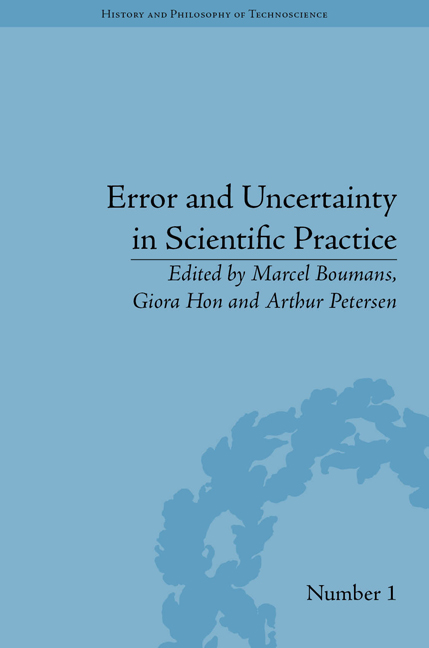Book contents
- Frontmatter
- Contents
- Acknowledgements
- List of Contributors
- List of Figures and Tables
- Introduction
- 1 The Lack of a Satisfactory Conceptualization of the Notion of Error in the Historiography of Science: Two Main Approaches and Shortcomings
- 2 Experimental Knowledge in the Face of Theoretical Error
- 3 Learning from Error: How Experiment Gets a Life (of its Own)
- 4 Modelling Measurement: Error and Uncertainty
- 5 Handling Uncertainty in Environmental Models at the Science–Policy–Society Interfaces
- 6 Variations on Reliability: Connecting Climate Predictions to Climate Policy
- 7 Order and Indeterminism: An Info-Gap Perspective
- 8 Learning from Data: The Role of Error in Statistical Modelling and Inference
- Notes
- Index
6 - Variations on Reliability: Connecting Climate Predictions to Climate Policy
- Frontmatter
- Contents
- Acknowledgements
- List of Contributors
- List of Figures and Tables
- Introduction
- 1 The Lack of a Satisfactory Conceptualization of the Notion of Error in the Historiography of Science: Two Main Approaches and Shortcomings
- 2 Experimental Knowledge in the Face of Theoretical Error
- 3 Learning from Error: How Experiment Gets a Life (of its Own)
- 4 Modelling Measurement: Error and Uncertainty
- 5 Handling Uncertainty in Environmental Models at the Science–Policy–Society Interfaces
- 6 Variations on Reliability: Connecting Climate Predictions to Climate Policy
- 7 Order and Indeterminism: An Info-Gap Perspective
- 8 Learning from Data: The Role of Error in Statistical Modelling and Inference
- Notes
- Index
Summary
Introduction
This chapter deals with the implications of uncertainty in the practice of climate modelling for communicating model-based findings to decision-makers, particularly high-resolution predictions intended to inform decision-making on adaptation to climate change. Our general claim is that methodological reflections on uncertainty in scientific practices should provide guidance on how their results can be used more responsibly in decision support. In the case of decisions that need to be made to adapt to climate change, societal actors, both public and private, are confronted with deep uncertainty. In fact, it has been argued that some of the questions these actors may ask ‘cannot be answered by science’. In this chapter, the notions of ‘reliability’ are examined critically; in particular the manner(s) in which the reliability of climate model findings pertaining to model-based high-resolution climate predictions is communicated. A broader discussion of these issues can be found in the chapter by Beck, in this volume.
Findings can be considered ‘reliable’ in many different ways. Often only a statistical notion of reliability is implied, but in this chapter we consider wider variations on the meaning of ‘reliability’, some more relevant to decision support than the mere uncertainty in a particular calculation.
- Type
- Chapter
- Information
- Error and Uncertainty in Scientific Practice , pp. 137 - 156Publisher: Pickering & ChattoFirst published in: 2014



